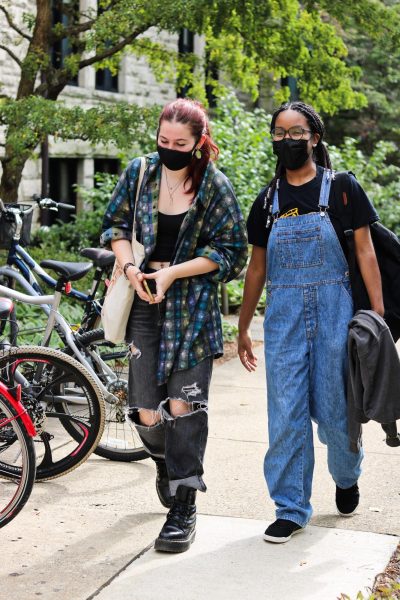Course Registration Issues Remain Unaddressed
The student community elected me to Student Senate so that I could push a three-point policy plan. You’ve probably heard about the first point: improving the variety, quality, and value of goods at DeCafé. While there’s plenty to be done, we’ve made substantial progress since the beginning of the semester. We’ve also been working hard at the second point, which is improving transparency in the Office of Residential Education. The third point is pushing a multifaceted policy package to fix course selection. With course selection for the spring semester coming up, there’s no better time to share my policy package than now.
While I was campaigning, several first-year students asked me why my course registration policy package is necessary. I first drafted many of these policies in Review article printed last spring (“We Need to Fix Course Registration — Here’s How,” April 12, 2019), in which I wrote extensively about the perils of course selection. To summarize, the following is what the course selection process looks like for the average Obie.
Before course selection begins, you have the option to apply to application-based courses. You often have to wait until after course selection is over to find out if you’ve been accepted, so in the meantime you sift through several sets of webpages to find courses that meet your needs and also allow you to fulfill your many graduation and major requirements.
After some time, you have a handy list of all the courses that could work. In addition to prerequisites, which ensure that students have enough foundational knowledge to move into higher-level courses, Oberlin also operates with a consent system. Some professors prefer to hand-select the students who will take their course for a variety of reasons, and so will not grant you “consent” to register for the course until you have emailed them to express interest or met with them to discuss why you are qualified to take that class. Supporters of consent restrictions argue this is good because of the autonomy it gives professors. Opponents argue it’s an extremely time-consuming process for students which leaves many in consent limbo.
Depending on how many students are interested in taking a course, some professors reply promptly, but they may take anywhere from a few days to more than a week to respond to your email. As you continue researching potential courses, you discover that many courses don’t count for things it seems they should count for — and that not a single syllabus (a very common motivator amongst Oberlin students for dropping a class) is available on the course registration website.
When your registration slot finally opens, and you don’t know if you’ve been accepted to the courses you applied to or asked for consent into, the selection of courses you are able to register for shrinks and shrinks — especially for younger students with less favorable registration times. To compensate, you register for courses you aren’t actually interested in, taking those spots from someone else who did want them. You couldn’t select any courses you could actually take during course selection.
When you’re done with course selection, it gets even worse. You have no idea what courses you’re going to end up taking. Stress permeates the back of your mind for the rest of the semester. Add/Drop becomes a mad and desperate scramble. You can’t buy your textbooks until you’ve got a working schedule, so you buy them a week into your classes. Since textbooks are priced based on demand, you just paid a lot more than you should have paid for them, because the system gave you no choice.
If you think our course selection system is broken, you’re not alone — but I’ve got a plan to fix it.
The first policy in my package deals with seminars, private readings, practicum courses, and all other application-based courses. Any professor teaching an application-only course should be given two choices: accept and consent students in before the first course selection time opens, or guarantee every applicant a spot. The wave of student displacement that has come from holding up these decisions is unacceptable.
The second policy deals with the consent system. Each course that requires consent should be re-evaluated to determine if that consent requirement could be replaced by a set of prerequisites, which would ideally be broad and inclusive. If so, prerequisites should be listed more clearly, and if not, guidelines on how students are selected for consent should be made available.
The third policy is to address the problems created by course requirements. Many of these requirements funnel students into a small number of courses regardless of whether students are interested. I think we should reappraise every general graduation and major requirement, choosing either to remove or reduce each. We should also expand the number of attributes on each course, to make requirements less stressful to fulfill. All courses that involve some application of science or mathematics should fulfill the Natural Sciences and Mathematics requirement, and the Cultural Diversity requirement should be opened up to all courses that expand students’ cultural understanding, et cetera.
Major requirements should also be reevaluated. In my opinion, the current graduation and major requirements are harsh, stringent, and unnecessary examples of an institution that doesn’t trust its students. Oberlin College, which generally attracts a demographic of mature and responsible students, should not support an educational philosophy based on the idea that we can’t make our own course choices. Policies denigrating our independence and our agency do not reflect our values and should be re-evaluated accordingly. We must alter graduation and major requirements to free the student body from an institution that does not understand our needs.
The final policy is simple: We must require the public availability of all syllabi on OberView. One of the most common reasons a student drops a course on the first day is when they receive the syllabus. This problem is extremely easy to fix, and would substantially reduce turnover. And this simple action would go a long way to raise the standards of transparency.
In summary, we must regulate application-only courses, reevaluate how and why professors consent students into their courses, reconsider our restrictive graduation and major requirements, and make syllabi available on OberView. If this policy package is implemented as described, we can fix course selection. With my policy package, students can save hundreds of dollars every semester and actually select courses that meet their needs during course selection. With just four policies, we can turn course selection from a time of stress to a time of excitement.




